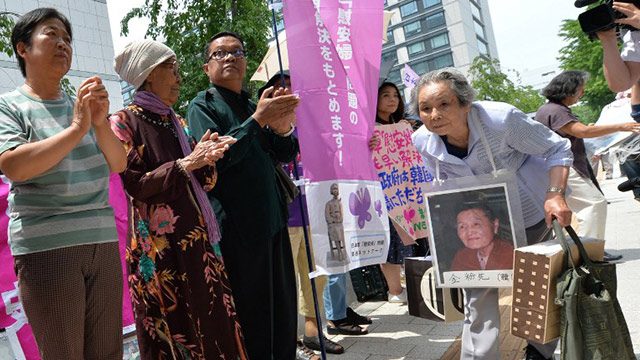SUMMARY
This is AI generated summarization, which may have errors. For context, always refer to the full article.

TOKYO, Japan – Japan lashed out at China Wednesday, June 11, for politicizing a United Nations agency with a bid to register papers on its wartime sexual slavery and the Nanjing massacre in a global document trove.
Beijing said Tuesday it wanted the United Nations Educational, Scientific and Cultural Organization (UNESCO) to include the information in the “Memory of the World” register, which is dedicated to preserving documentary heritage.
Chief Cabinet Secretary Yoshihide Suga denounced the plan, telling reporters Wednesday it was a backward-looking move that would not help to resolve bitter disputes between the two countries, and urging Beijing to reverse course.
“At a time when efforts are needed to improve Japan-China relations, it is extremely regrettable that China moved to make political use of the UNESCO forum and to unnecessarily play up the negative legacy of ties from a period of the past,” he said.
That came after Chinese foreign ministry spokeswoman Hua Chunying announced on Tuesday that Beijing wanted the documents registered to help the world to remember the sufferings Japan had inflicted.
After Suga spoke in Tokyo, Hua said China would not withdraw its application.
“Yesterday, I have said that China’s application to the Memory of the World is to memorialize history, protect human dignity, and prevent those crimes against humanity and human rights from happening again,” she said.
“We will not accept the unreasonable request from Japan and we will not withdraw the application,” Hua said.
History poisons ties
In the 1937 “Rape of Nanjing,” China says 300,000 people were killed and thousands raped as Japanese troops rampaged through the city during their invasion of the Asian mainland.
No respected historian disputes that imperial troops were responsible for large-scale atrocities, but some in Japan and abroad say the Chinese death toll is inflated.
Japan’s system of sex slavery up to and during World War II, in which thousands of mainly-Korean “comfort women” were forced into military brothels, continues to cause revulsion.
Numerous apologies have not dampened calls for Japan to properly atone for the practice, while equivocations from senior Japanese politicians – including Prime Minister Shinzo Abe – have exacerbated the impression that Tokyo wants the world to forget the horrific practice.
China’s bid to get the documents on the register – which includes Magna Carta and Beethoven’s 9th Symphony – is the latest example of the way history continues to poison ties between Asia’s two largest economies.
Relations have become increasingly sour since Japan nationalized islands in the Tokyo-controlled Senkaku chain in the East China Sea in 2012.
Beijing says the islands, which it calls the Diaoyus, have belonged to China for hundreds of years, and their 1895 incorporation into Japan marked the opening shots of a half-century-long campaign to invade and subjugate Asia, culminating in World War II.
Critics in Japan and elsewhere say China uses history as a cudgel to beat Tokyo, largely for a domestic audience, despite its nearly seven-decade commitment to pacifism. – Rappler.com
Add a comment
How does this make you feel?
There are no comments yet. Add your comment to start the conversation.